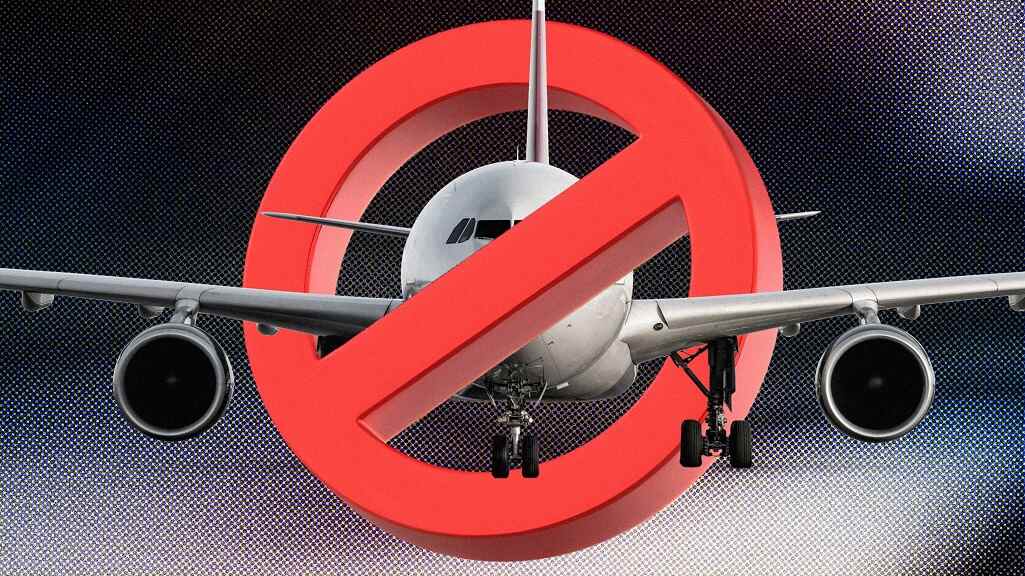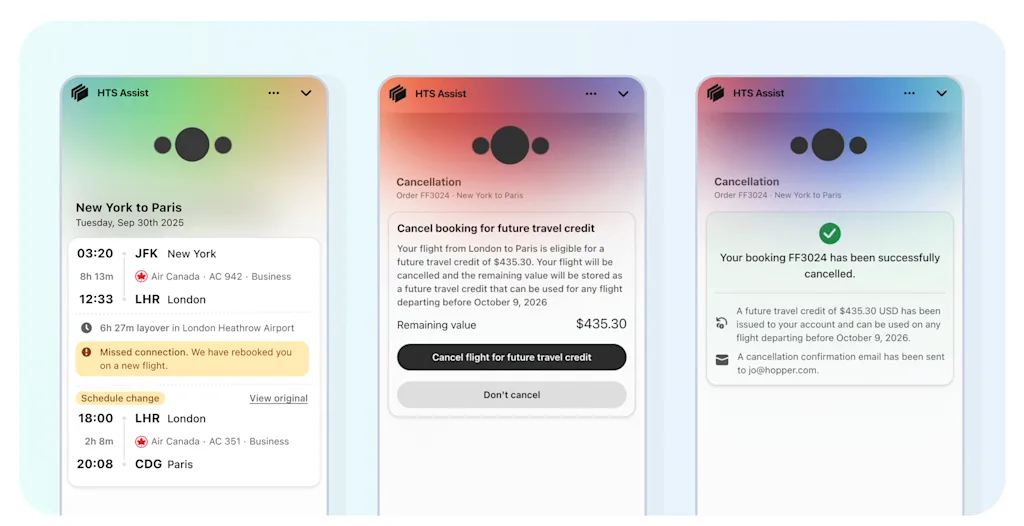- | 8:00 am
Your flight’s canceled—now what? Ask the AI travel agent
Hopper, the price-predicting travel app, just debuted its latest innovation: a chatbot that can help with your biggest travel headaches.

It’s a familiar frustration: You miss your connection because of a delayed flight. The line at the customer assistance desk is 30 people deep. The airline app offers little help, and the call center puts you on hold for half an hour. Will you ever escape Newark Liberty International Airport (EWR)?
Enter Hopper Technology Solutions (HTS) Assist, a new generative AI travel agent that helps customers with post-booking travel questions, changes, and disruptions. HTS assist was built by Hopper, the mobile-only travel-booking platform that’s known for its intuitive, user-friendly interface and for predicting flight prices with near-flawless accuracy and pinging users when it’s time to book.
A few clicks—“my trips” and “contact support”—from Hopper’s main page now opens an interface where travelers can talk to or text the AI assistant for help with things like rebooking missed connections and processing refunds for canceled trips.
HTS Assist is built to converse in natural language—it’s been trained on millions of real-world conversations—and is capable of communicating in 30 different languages. Hopper says it has taken a “model-agnostic” approach to creating HTS Assist, working with leading large language models and its own travel-specific training data.
Crucially, the chatbot is plugged directly into the complex travel tech stack of airline booking platforms, hotel reservation systems, car rental options, payments, and more, allowing other travel companies to offer customers their own version of the customer service chatbot.

HTS Assist already lives inside a couple of partner platforms—Korean credit card company Lotte Card and Japanese bank Sumitomo Mitsui Banking (SMB)—with more deals in the works, according to Hopper. These partnerships are handled by Hopper’s B2B arm, Hopper Technology Solutions, or HTS, which currently powers the travel portals of Capital One, Uber, Lloyds, and others with personalized booking software. HTS is now responsible for 90% of Hopper’s revenue.
This new agent could unlock even more.
A growing demand for shrinking customer service
Over the past few decades, the number of frontline service reps has steadily shrunk, even as passenger numbers climb. (American Airlines, for example, cut 8.2% of its customer service positions last year.) Automated phone trees and maddening chatbots have taken their place, infamous for endless loops and little transparency, leaving travelers stranded at the exact moment they need help most.
“Travel is one of the most stressful, emotionally charged, and operationally complex industries,” says Jo Lai, head of AI solutions and customer Experience at HTS. “Unlike other consumer categories, when things go wrong in travel, people’s lives are immediately disrupted.”
Hopper believes HTS Assist’s capabilities are uniquely suited to bridge the gap between customer demand—half of travelers require some kind of servicing during their trip—and rising expectations: travelers want instant, consistent resolutions across various platforms. The assistant can be scaled during peak surges without requiring an army of new hires, and it resolves issues with the same tools human agents use.
“HTS Assist doesn’t mind if it’s helping one person or 65,000,” says Frederic Lalonde, Hopper founder and CEO. “It’s there for you immediately, and stores all of your information in one place.”
According to Hopper, HTS Assist works four times as fast as traditional customer service channels. And cost savings for companies could be meaningful. Thanks to fewer backlogs, lower error rates, and less reliance on constantly hiring and retraining agents, Hopper estimates that airlines and travel providers could reduce service costs by up to 65%.
Assist could also drive ancillary revenue. If a passenger misses a flight, the agent will first comb through available benefits like meal or hotel vouchers. If those fall short, it offers hotel stays or car rentals that feel like natural extensions of the interaction. So far, 15% of AI agent conversations have led to ancillary sales.
Putting the assistant to the test
The travel industry is already awash in chatbots offering to help with everything from travel planning to booking. Tripadvisor has an AI assistant tailor-made for trip planning. Marriott is testing a personalized chatbot for its loyalty program members that can act as both a booking agent and concierge. Airlines of all stripes, meanwhile, have debuted chatbots, with varying degrees of success.
As they’re discovering, a good chatbot can solve problems and smooth travel hiccups. A bad one just makes things worse.
To get a sense of HTS Assist’s capabilities, Fast Company participated in a few live demos to test the system against common traveler frustrations: missed flights, refund requests, and alternative plans. Prompted by Lai, the virtual assistant worked fluidly through a casual back and forth.
The first demonstration was based on Hopper Technology Solutions’ flagship design for potential external partners. Playing the part of the rushed traveler, Lai interrupted HTS Assist (it recovered easily) and asked it to handle trickier tasks, like rerouting rental cars to different drop-off locations and syncing with friends’ travel plans.
The assistant also asked helpful questions—a manual or automatic car?—that trimmed down options. The design interface, which shifted colors and communicated behind-the-scenes “thinking” with a trio of merging dots, was almost meditative.
“We can also dial up or down the assistant’s formality and empathy level,” says Lai, depending on a company’s culture, branding, and voice.
A second set of self-led demos via Hopper’s in-app chat and customer service phone line was a bit more clunky, and has yet to incorporate HTS Assist’s new design and feel (that will roll out in the coming days). The assistant couldn’t upgrade a flight to business class, for example, without canceling and rebooking the flight altogether. It also couldn’t add a day to a hotel reservation without also canceling and rebooking new dates.
Still, it was compelling—it listed airline baggage fees associated with our reservation, for example, and it had tips for going through security in Canada, the flight’s country of origin.
HTS Assist also can’t replicate the sympathetic agent who ignores an overweight bag or lets you change seats free of charge (yet). But it is designed to escalate to a live agent when needed.
And while the technology is currently focused on post-booking fallouts rather than the travel planning journey, the ladder is certainly on the horizon. “We’re really excited about the AI commerce category and conversational commerce as a whole,” says Lai.
For now, at least, you won’t be stuck at EWR.







































